This article was co-authored by Klare Heston, LCSW. Klare Heston is a Licensed Independent Clinical Social Worker based in Cleveland, Ohio. With experience in academic counseling and clinical supervision, Klare received her Master of Social Work from the Virginia Commonwealth University in 1983. She also holds a 2-Year Post-Graduate Certificate from the Gestalt Institute of Cleveland, as well as certification in Family Therapy, Supervision, Mediation, and Trauma Recovery and Treatment (EMDR).
This article has been viewed 45,521 times.
If you repetitively pick at your skin— whether knowingly or unknowingly— you may have a condition called dermatillomania, or excoriation disorder. Your loved ones may tell you to "just stop," but quitting on your own is much easier said than done. First, get support kicking the habit by consulting with a mental health provider who can prescribe an individualized treatment plan. Then, figure out your triggers. Once you know what causes you to pick, you can avoid those situations, or implement new habits that prevent you from picking your skin.
Steps
Treating Skin-Picking Disorder
-
1Have your doctor refer you to an OCD specialist. Dermatillomania is often associated with obsessive-compulsive disorder, so you might benefit from seeing a psychiatrist or psychologist who has experience treating OCD. Ask your family doctor for a referral to see a mental health specialist.[1]
- When you meet with the specialist, be sure to share as much detail about your compulsive skin-picking as you can. Tell your doctor when the picking usually happens and what you are doing or feeling before it takes place.
-
2Take SSRIs to manage your symptoms. Dermatillomania may indicate an underlying case of anxiety or depression. If your doctor determines this to be true in your case, they may prescribe SSRIs to ease your symptoms.[2]
- SSRIs, or selective serotonin reuptake inhibitors, are a special class of antidepressants found to be useful in managing obsessive thoughts relating to skin-picking.
Advertisement -
3Try cognitive-behavioral therapy to change your picking habits. Ask your doctor about psychotherapeutic treatments for dermatillomania such as CBT. This form of talk therapy has been proven helpful for people with skin-picking disorder.[3]
- CBT can help you and your mental health provider identify thoughts that may provoke skin-picking, like being worried about failing a test or being self-conscious about a facial blemish.
- In CBT, you can learn to challenge negative thought patterns that lead to skin-picking and reverse the habit with help from your therapist.
-
4Attend support group meetings relating to your condition. If an underlying condition like OCD, anxiety, or depression is influencing your dermatillomania, it may help to talk with others who have the same condition. Support groups can help you feel less alone in dealing with mental illness.
- Search for support groups that specifically address dermatillomania, too. Ask your mental health provider for recommendations.
Dealing with Your Triggers
-
1Observe your skin-picking for a week to discover your triggers. Take note of situations that trigger compulsive skin-picking. For a week, write down what happened before you got the urge to pick in a log or diary.[4]
- Did your boss yell at you? Did you feel rejected by a friend or lover? Did you react to catching a glimpse of your reflection in a mirror?
- Pinpointing common triggers can help you develop a plan to avoid or cope with them.
-
2Don't look in the mirror as often. If mirrors trigger your tendency to obsess over skin imperfections, reduce your exposure to them. Put away or cover some of the mirrors in your home. Or, use the restroom in the dark.
- If you must use the mirror when you get dressed or apply makeup, set a timer for 5 to 10 minutes.
- Avoid looking in a close-up, or magnifying, mirror as well.
-
3Overcome negative thinking with positive affirmation. Sometimes dermatillomania arises from self-consciousness about your body or appearance. Eliminate negative thinking by showering yourself with positive affirmations regarding your looks and abilities.[5]
- You might put up post-its on your mirror that read: “You look great just as you are!” Or repeat compliments to yourself, like “You're smart and capable” or “You have a nice smile.”
-
4Put away picking instruments. If you use scissors, tweezers, or pins to scratch or pick at your skin, limit your access to these items. Store them in a hard-to-reach place, trash them, or put someone else in charge of your access to them.[6]
- For instance, you might set a rule that you must ask permission before using your mom's tweezers and you must use them in her presence.
-
5Practice relaxation techniques to ease anxiety. Not all triggers can be avoided. If general life stress contributes to your compulsive skin-picking, it might be helpful to do stress management exercises.[7]
- Mindfulness meditation, deep breathing, and progressive muscle relaxation are all strategies you can use to ease the anxiety that leads to picking.
- You can try these techniques before, during, or after you encounter a stressful situation.
Using Coping Strategies
-
1Put on gloves. Prevent yourself from picking by covering your hands as often as possible, especially during trigger situations. Wear a pair of gloves until the urge passes.[8]
- If you pick at your skin unknowingly, wear gloves all the time. That way, you will become more aware of the habit.
-
2Wear makeup. Wearing liquid or cream foundation can help stop dermatillomania because it creates a barrier. Whenever you touch your face, for example, you will smudge the makeup.
- This works especially well if you compulsively pick at the skin on your face.
-
3Clip your nails or get acrylic nails. Altering your nails can cut down on picking also. Make them extremely short so that you have difficulty using them to scratch or pick at your skin. Getting fake acrylic nails can also prevent you from picking.
-
4Apply oil or moisturizer to picking zones. Stop dermatillomania by putting a thick or creamy oil or lotion on the areas where you generally pick. This will make the area slick so that it's harder to pick at the skin beneath. Plus, it's a way of caring for your skin instead of harming it.[9]
- Try applying vitamin E, olive, or avocado oil to your skin. Or invest in a nourishing moisturizer in a soothing or cheerful scent.
-
5Get a fidget toy.[10] Occupy your hands when you get the urge to pick at your skin. Play a with a squishy ball or a fidget spinner until the urge passes.
-
6Do a constructive activity. Keep yourself busy when you get the urge to pick by working on a puzzle or doing homework. Or, knit, paint, or write to occupy your hands. You could also download several creative apps on your phone or tablet and use them when you have the urge to pick your skin.
Expert Q&A
-
QuestionIs Dermatillomania a mental illness?
 Klare Heston, LCSWKlare Heston is a Licensed Independent Clinical Social Worker based in Cleveland, Ohio. With experience in academic counseling and clinical supervision, Klare received her Master of Social Work from the Virginia Commonwealth University in 1983. She also holds a 2-Year Post-Graduate Certificate from the Gestalt Institute of Cleveland, as well as certification in Family Therapy, Supervision, Mediation, and Trauma Recovery and Treatment (EMDR).
Klare Heston, LCSWKlare Heston is a Licensed Independent Clinical Social Worker based in Cleveland, Ohio. With experience in academic counseling and clinical supervision, Klare received her Master of Social Work from the Virginia Commonwealth University in 1983. She also holds a 2-Year Post-Graduate Certificate from the Gestalt Institute of Cleveland, as well as certification in Family Therapy, Supervision, Mediation, and Trauma Recovery and Treatment (EMDR).
Licensed Social Worker It is more accurate to say that it is a behavioral problem which can be part of Obsessive-Compulsive Disorder (OCD), which is classified as a mental illness. Often people who pick at their skin can have underlying anxiety or depression.
It is more accurate to say that it is a behavioral problem which can be part of Obsessive-Compulsive Disorder (OCD), which is classified as a mental illness. Often people who pick at their skin can have underlying anxiety or depression. -
QuestionIs picking at your skin a sign of anxiety?
 Klare Heston, LCSWKlare Heston is a Licensed Independent Clinical Social Worker based in Cleveland, Ohio. With experience in academic counseling and clinical supervision, Klare received her Master of Social Work from the Virginia Commonwealth University in 1983. She also holds a 2-Year Post-Graduate Certificate from the Gestalt Institute of Cleveland, as well as certification in Family Therapy, Supervision, Mediation, and Trauma Recovery and Treatment (EMDR).
Klare Heston, LCSWKlare Heston is a Licensed Independent Clinical Social Worker based in Cleveland, Ohio. With experience in academic counseling and clinical supervision, Klare received her Master of Social Work from the Virginia Commonwealth University in 1983. She also holds a 2-Year Post-Graduate Certificate from the Gestalt Institute of Cleveland, as well as certification in Family Therapy, Supervision, Mediation, and Trauma Recovery and Treatment (EMDR).
Licensed Social Worker Yes, picking at your skin can be a sign of anxiety and/or depression. The severity can very from mild to very serious.
Yes, picking at your skin can be a sign of anxiety and/or depression. The severity can very from mild to very serious. -
QuestionDo I have Dermatillomania?
 Klare Heston, LCSWKlare Heston is a Licensed Independent Clinical Social Worker based in Cleveland, Ohio. With experience in academic counseling and clinical supervision, Klare received her Master of Social Work from the Virginia Commonwealth University in 1983. She also holds a 2-Year Post-Graduate Certificate from the Gestalt Institute of Cleveland, as well as certification in Family Therapy, Supervision, Mediation, and Trauma Recovery and Treatment (EMDR).
Klare Heston, LCSWKlare Heston is a Licensed Independent Clinical Social Worker based in Cleveland, Ohio. With experience in academic counseling and clinical supervision, Klare received her Master of Social Work from the Virginia Commonwealth University in 1983. She also holds a 2-Year Post-Graduate Certificate from the Gestalt Institute of Cleveland, as well as certification in Family Therapy, Supervision, Mediation, and Trauma Recovery and Treatment (EMDR).
Licensed Social Worker Is your skin picking fairly regular? Do you have marks or scabs that don't heal? If so, you might consider seeing either a medical doctor or a therapist who specializes in the treatment of anxiety.
Is your skin picking fairly regular? Do you have marks or scabs that don't heal? If so, you might consider seeing either a medical doctor or a therapist who specializes in the treatment of anxiety.
References
- ↑ http://www.mentalhealthamerica.net/conditions/excoriation-disorder-skin-picking-or-dermatillomania
- ↑ http://www.merckmanuals.com/professional/psychiatric-disorders/obsessive-compulsive-and-related-disorders/excoriation-skin-picking-disorder
- ↑ http://www.merckmanuals.com/professional/psychiatric-disorders/obsessive-compulsive-and-related-disorders/excoriation-skin-picking-disorder
- ↑ https://www.skinpick.com/dermatillomania-treatment
- ↑ https://www.bfrb.org/learn-about-bfrbs/treatment/self-help/127-rs-list-of-strategies-for-skin-picking-49-im-using-42-i-could-try
- ↑ https://www.nhs.uk/conditions/dermatillomania/#tips-for-quitting
- ↑ https://www.skinpick.com/dermatillomania-treatment
- ↑ https://www.skinpick.com/dermatillomania-treatment
- ↑ https://www.nhs.uk/conditions/dermatillomania/#tips-for-quitting




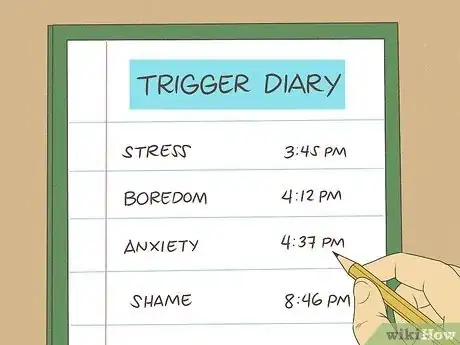
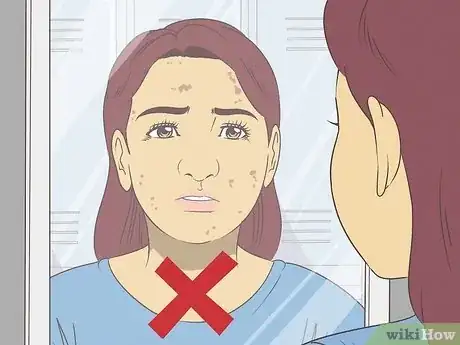
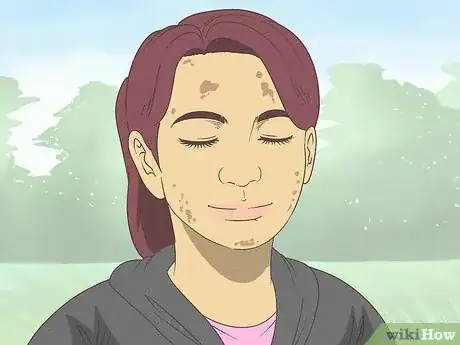
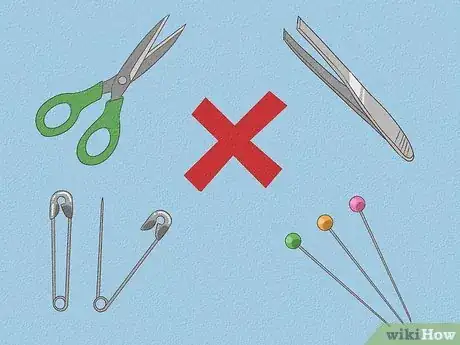

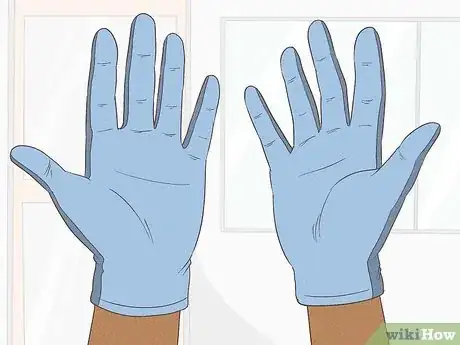
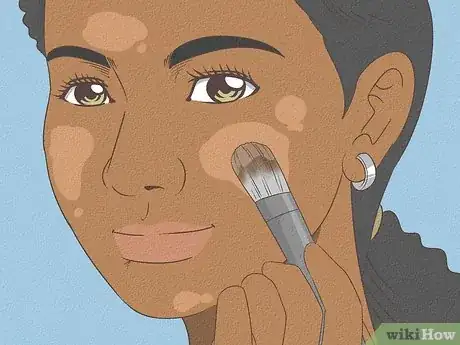
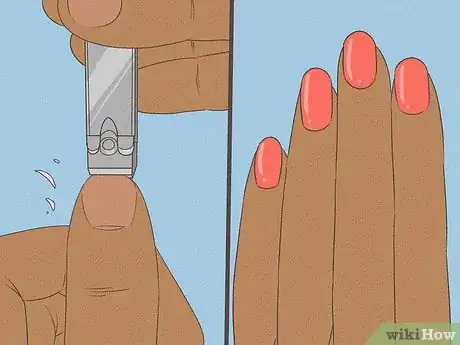
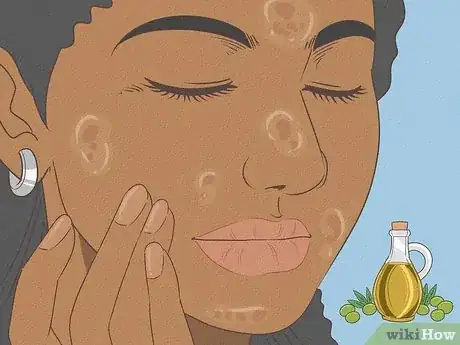
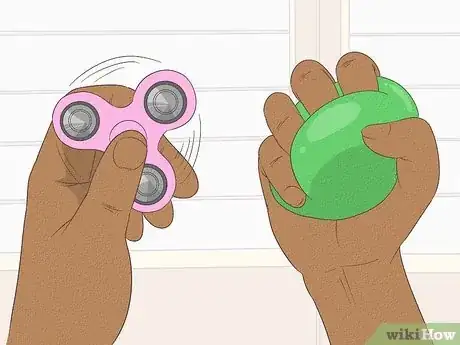
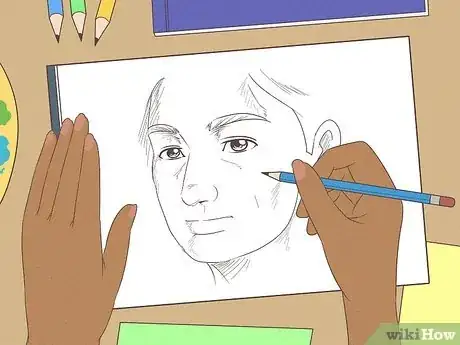





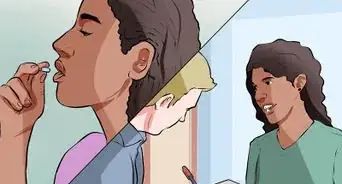
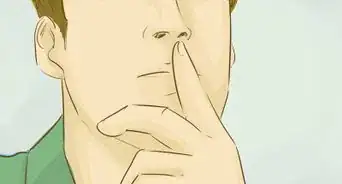
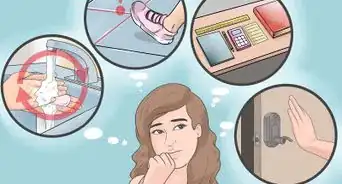










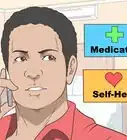

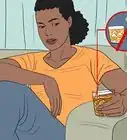




































Medical Disclaimer
The content of this article is not intended to be a substitute for professional medical advice, examination, diagnosis, or treatment. You should always contact your doctor or other qualified healthcare professional before starting, changing, or stopping any kind of health treatment.
Read More...